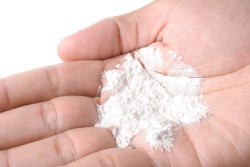Top Class Actions’s website and social media posts use affiliate links. If you make a purchase using such links, we may receive a commission, but it will not result in any additional charges to you. Please review our Affiliate Link Disclosure for more information.

However, talcum powder dangers are a reality, backed up by research studies. Why these dangers are not more well-known is not apparent, but it is important to know your risk if you choose to use baby powder and how you choose to use it.
Baby Powder Dangerous Ingredient
Most baby powders contain talc in the form of talcum powder. Talc is one of the softest minerals on earth, and very absorbent. It is found in mines and it is made up of the elements magnesium, silicon and oxygen. Some baby powders are cornstarch-based, so it is important to note that the baby powders that cause an increased cancer risk are the ones that contain talc powder.
Talc Powder Cancer Risk
A reason much information about the talc powder cancer risk might be so hush-hush is due to the way baby powder is used when it increases cancer risk.
Women who use baby powder in their genital area as part of their personal beauty routine are the ones at a higher risk for ovarian cancer. Sharing your private beauty routine when it involves wetness and odor is simply not something many people discuss.
However, the information should be more widely shared, because confidential surveys of women show that over 40 percent of women use a talc baby powder product in their genital area every single day. And the increased risk of these women developing ovarian cancer from this routine is 41 percent over women who don’t.
Talc Powder Ovarian Cancer Research Studies
In 1971, the first research study was done that showed an association between talc and ovarian cancer. Researchers studied ovarian tumors of women and found talc particles embedded deeply in every single one of them.
A decade later, a study showed the first significant relationship between genitally applied talcum baby powder and ovarian cancer. Since then, another 20 plus studies have shown a link between baby powder use and ovarian cancer.
Baby Powder Cancer Lawsuit Information
In 2013, a woman filed a baby powder cancer lawsuit against Johnson & Johnson for her alleged development of ovarian cancer following her use of baby powder. The jury found Johnson & Johnson guilty, but in a shocking outcome, Johnson & Johnson paid no damages to the woman in the case.
About 700 women have made the link to their ovarian cancer and their use of baby powder and have since filed lawsuits against Johnson & Johnson for failing to warn consumers about the increased risk.
If you or someone you know has ovarian cancer and has used talcum powder or baby powder, you may have a legal claim. Individual lawsuits may be filed, and an opportunity to join a baby powder class action lawsuit against Johnson & Johnson may be available.
Do YOU have a legal claim? Fill out the form on this page now for a free, immediate, and confidential case evaluation. The attorneys who work with Top Class Actions will contact you if you qualify to let you know if an individual lawsuit or class action lawsuit is best for you. [In general, baby powder cancer lawsuits are filed individually by each plaintiff and are not class actions.] Hurry — statutes of limitations may apply.
ATTORNEY ADVERTISING
Top Class Actions is a Proud Member of the American Bar Association
LEGAL INFORMATION IS NOT LEGAL ADVICE
Top Class Actions Legal Statement
©2008 – 2024 Top Class Actions® LLC
Various Trademarks held by their respective owners
This website is not intended for viewing or usage by European Union citizens.
Get Help – It’s Free
Join a Free Baby Powder Cancer Class Action Lawsuit Investigation
If you used Johnson’s Baby Powder, Shower to Shower, or another talcum powder product and were diagnosed with ovarian cancer, you may have a legal claim. Family members of loved ones who died of ovarian cancer can also join. Submit your information now for a free case evaluation.
An attorney will contact you if you qualify to discuss the details of your potential case at no charge to you.












